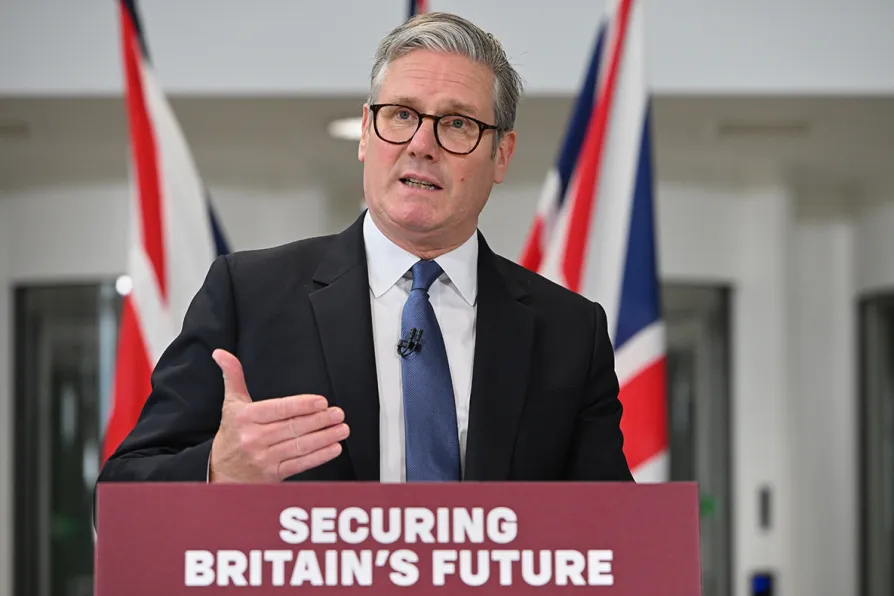
 Prime Minister Sir Keir Starmer speaks to the media at Strategic Command Headquarters, in Northwood, Greater London May 22, 2025
Prime Minister Sir Keir Starmer speaks to the media at Strategic Command Headquarters, in Northwood, Greater London May 22, 2025
ANDREW MOUNTBATTEN WINDSOR has been stripped of his rank of vice-admiral. That is one more redundant uniform down to the British Legion charity shop.
It seems unlikely that Britain’s defence capability will be much diminished by this loss. It is a long time since the the disgraced and demoted “royal” flew a helicopter in the defence of Britain’s imperial domain in the south Atlantic.
It was the pseudo-patriotic fervour whipped by a toxic mixture of politicians-on-the-make and a gung-ho media that turned what should have been a grown up agreement to decolonise the Malvinas into a war.
This unnecessary and undeclared war with General Leopoldo Galtieri’s US-backed Argentinian dictatorship and a Britain led by Margaret Thatcher — close intimate of the US-backed Chilean dictator Augusto Pinochet — saw 649 Argentinian, 255 British military personnel and three local civilians killed.
Last February the Prime Minister announced an increase in military spending to 2.5 per cent of GDP from April 2027 with a planned intermediate rise to 3 per cent of GDP before the 5 per cent end goal.
Keir Starmer’s commitment is to the biggest investment in war spending since the cold war, “as the UK enters an era of intensifying geopolitical competition and conflict.”
Quite how Schrodinger’s Russian army, currently moving at a snail’s pace across the Ukrainian plains, can simultaneously present an existential threat to Starmer’s Camden constituency remains to be explained but the Premier chose the British/US arms giant BAE Systems’ Clydeside shipyard to insist that military spending should be prioritised over welfare and public services.
This defence derangement syndrome is not confined to our trigger-happy Prime Minister. When the war drums sound fiscal rectitude over public spending vanishes.
In a couple of weeks the European Commission is set to present its plans to upgrade European transport logistics into a more perfect instrument of war. In an echo of Hitler’s autobahn programme, which orientated Nazi Germany’s transport network eastwards, the European Union is assuming a new role in co-ordinating military logistics with Poland, Germany, Romania, the Netherlands and the Baltic states identified as key transport nodes to enable the EU’s war-fighting partnership with Nato to project its force along the Wehrmacht’s well-trodden route.
Funding is to come from the Nato-inspired and EU-sanctioned boost in war spending originally seen as a response to Donald Trump’s insistence on Europe bearing more the cost of Nato.
Since US strategy is increasingly out of sync with European “defence” thinking, the co-ordination of European states is conceived of a the logical expression of the continent’s common “defence” interests.
The illusion that Europe is a continent of peaceful co-operation ignores a long history that includes the postwar British intervention to install a right-wing regime over the Resistance forces that defeated the German army; the British war against the Cyprus independence movement and Turkish invasion in 1974, the Nato bombing and dismemberment of Yugoslavia in the ’90s and the present day Nato-proxy war in Ukraine. Not excluding the many wars the colonial powers, Britain, France and Portugal fought in Africa.
The postwar stand-off between the socialist bloc and Nato ensured a rough parity and a tense but manageable coexistence. The 1980s siting of new US missiles in Europe sparked a renewed war crisis that saw the Labour Party backing massive demonstrations against the missiles and peace movement women besieging the missile sites in Greenham Common.
Today a Labour government is ramping up defence spending boosted by bellicose war rhetoric.
Dangerous times threaten. Liberal opinion that idealises the EU as a sphere of pacific co-operation needs to get real. Britain could sensibly follow the Irish in opting for neutrality and an ethical foreign policy which can only be pursued when we are disentangled from this poisonous EU tie-up and Nato.










